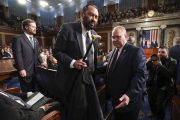
The other shoe has dropped. This week, top Army and Marine Corps generals urged the Senate Armed Services Committee to change the law and require young women to register for any possible draft. Navy Secretary Ray Mabus and Acting Army Secretary Patrick Murphy were less sure, only willing to say the issue should be discussed.
Once Secretary of Defense Ash Carter issued an order in December for the armed forces to open all combat jobs to women, it was inevitable that the question of whether women should be forced to register like young men would be thrown into the lap of Congress.
The U.S. Supreme Court ruled in 1981 that it was constitutional for Congress to exclude women in draft registration. Their reasoning at the time was that since women were excluded from combat roles, it followed that registration did not need to include women. The United States ended the military draft in 1973, but Congress reimplemented registration of men at age 18 at the urging of President Jimmy Carter. Carter’s argument was that if an actual draft were later needed, the pool of names would already be available. Of course, this was during the Cold War. There has been little political support since that time for a peacetime draft. Even despite his military buildup in the 1980s, President Ronald Reagan opposed the draft, as has every president since.
The all-volunteer military has been used in several conflicts, including the invasion of Panama, the first Iraq War, interventions in Bosnia, the invasions of Afghanistan and Iraq, and in other military actions.
But, since the reason the Supreme Court allowed women to be excluded from draft registration — the fact that women are barred from combat — is no longer in effect, the issue could very well appear before the Court again. The Selective Service System, which oversees the draft registration of young men when they turn 18, has been sued by a woman in New Jersey who contends she is being discriminated against because she is not allowed to register. In contrast, the National Coalition for Men has likewise sued, but their argument is that it is discriminatory toward men that women are not included.
When Defense Secretary Carter unilaterally decided to include women in combat, the Marine Corps was hesitant to agree, expressing concern that women in combat roles would make the Marine Corps a less-efficient fighting machine.
Now, the Senate Armed Services Committee has asked the military leaders if they also support the inclusion of women in draft registration. While it is understandable that Congress should make the final decision on whether to require women to register, one might also ask, should not it also have been up to Congress to decide whether to include women in combat?
After all, the U.S. Constitution, in Article I, Section 8, states that it is up to Congress to “make rules for the government and regulation of the land and naval forces.” Would that not include whether women should be included in combat roles?
As noted above, Army General Mark Milley and Marine General Robert Neller told senators that women should be required to register for selective service at age 18, just like men. Navy Secretary Ray Mabus and Army Acting Secretary Patrick Murphy just said that the issue should be discussed.
General Milley told the senators that the Army will follow a “deliberate, methodical approach that begins with assessment, selection, training and assigning of female infantry and armor leaders — both officers and NCOs to units.”
Armed Services Committee Chairman Senator John McCain (R-Ariz.) said he supported the decision to open direct combat jobs to women, but he also said it was important to maintain high standards.
“We have the responsibility to do the right thing,” McCain said, but he added, “we also have an equal responsibility to do the right thing in the right way; that is what this hearing is about — ensuring that as women move into more and more positions across our military, readiness, combat effectiveness and the safety and well-being of all service members — both men and women — remain our paramount priority.”
A 1,000-page study from last fall by the Marine Corps Ground Combat Element Integrated Task Force (GCEITF) was the focus of much of the hearing. The GCEITF concluded that gender-integrated units made up of males and females did not perform as well as all-male units. These units said that gender-integrated units suffered a higher injury rate than all-male units.
Navy Secretary Mabus publicly criticized the report, but Senator McCain questioned whether Mabus had even read the report.
“Secretary Mabus, this would have been a lot easier if you hadn’t called in the press immediately and debunked what many of us view as a legitimate study without even reading it, and I don’t believe you read a 1,000-page document in one day,” said McCain, whose own illustrious military career launched his political career. McCain was a prisoner of war in Vietnam.
Senator Jeff Sessions (R-Ala.) pointed out that the Marine study found that women did not perform as well as men. The study demonstrated that all-male units had higher performance levels than did gender-integrated units on 69 percent of tasks evaluated. In contrast, gender-integrated teams outperformed the all-male units on only two of the 134 tasks.
But Senator Kirsten Gillibrand (D-N.Y.) called it a “fundamentally flawed” study, because the female Marines were not as experienced as the male Marines. “All we really know from the study is that groups who had the right training and more training did better.”
Marine General Neller told the senators, “One of my biggest concerns is the perception that the Marine Corps doesn’t value the service of females that serve in the Marine Corps.”
General Neller’s idea of what should concern the military appears to be influenced by modern political correctness. For example, former Army Chief of Staff George Casey had an odd reaction to the Fort Hood shooting, in which Major Nidal Malik Hasan, an Army psychiatrist, murdered 13 people. Witnesses testified that Major Hasan, a Muslim, shouted pro-Islamic slogans during the shooting, but General Casey said, “I’m concerned that this … could cause a backlash against some of our Muslim soldiers.”
“Diversity … is a strength,” Casey insisted. “And as horrific as this tragedy was, if our diversity becomes a casualty, I think that’s worse.” Worse? Worse than the murder of 13 of his soldiers?
Casey and Neller both seem to believe a devotion to “diversity” is a huge “concern.” In the case of Neller, instead of his “biggest” concern being the perception on how the Marine Corps values the service of females, what should be of much greater concern for all members of the armed forces is to win a war if called upon to do so. As General Douglas MacArthur said, the military holds the nation’s “destiny” in its hands “the moment the war tocsin sounds.”
To win that war, should it come, it is imperative that the armed forces be as strong as possible — not weakened by politically correct notions of “diversity.”
Concerns over whether men and women serving in close quarters in a wartime situation would give the armed forces a better chance to win a war is apparently not a major concern to the politically correct general officers of the U.S. armed forces in the 21st century. Questions of how the presence of women serving alongside men will affect cohesiveness and ability do not appear to be as important as questions of diversity to these military leaders.
In the debate over the efforts to pass the so-called Equal Rights Amendment (ERA) in the 1970s, opponents expressed concern that its passage would lead to the drafting of women and their insertion into combat roles, with all the problems that would cause. Those who favored the ERA dismissed such concerns as simply “scare tactics.” They also ridiculed the concerns of those who feared that passage of the ERA would require unisex restrooms, with men insisting on the right to use the same facilities as women.
This should be instructive. Progressives are willing to deny the logical consequences of their proposals — until they get enough power through the courts, Congress, or the executive branch to impose them. Then, as President Barack Obama did with same-sex marriage, they “evolve.”
Steve Byas is a professor of history at Hillsdale Free Will Baptist College in Moore, Oklahoma. He is the author of History’s Greatest Libels.




